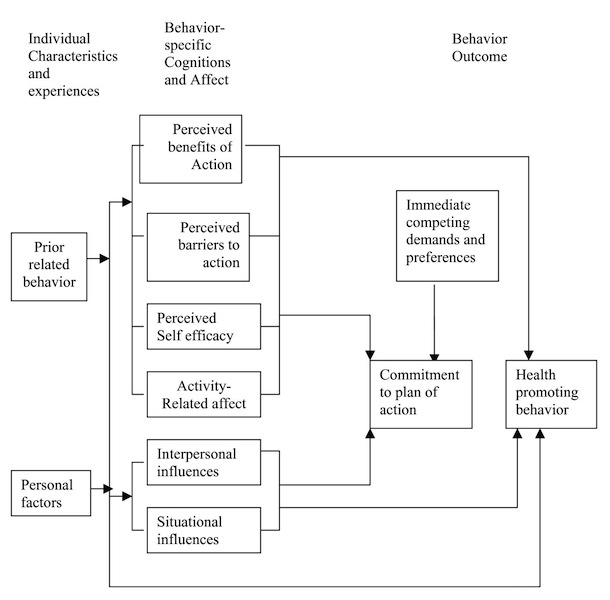Theoretical framework
Since one of the leading causes of colorectal cancer is the behavioral pattern that one assumes in his or her lifestyle, there is need to integrate an intervention plan as part of comprehensive health care. Basically, physical exercise is known to be one of the factors that may help in suppressing colorectal disease (McKenzie, Neiger, & Thackeray, 2009). Since most of old people rarely engage in physical exercise, this type of cancer is very common among the elderly. Therefore, behavioral factors can be addressed if the affected person is willing to change as discussed in the proposed health promotion model.
Health Promotion Model
Health promotion is the strategy adopted by relevant agencies to make a community free of diseases. Reflectively, health promotion encompasses the state of an individual in relation to diseases. The approach encompasses different strategies that are applied to ensure that an individual has a healthy lifestyle. Basically, health promotion endeavors to create a sustainable balance in the mental, intellectual, environmental and physical elements of health.
For instance, promotion of healthy eating habits and behavioral elements such as physical exercise are examples of wellness promotion programs which can be applied to reduce colorectal cancer among the elderly persons. According to Lundy and Janes (2009), “health promotion is broader and deals with dysfunction in addition to prevention of a disease” (Lundy & Janes 2009, p. 42).
Integrated intervention model
Proposed and developed by Dr. Nola Pender, health promotion model is critical in facilitating achievement of high and desirable levels of well-being. In relation to interventional plan for reducing colorectal cancer, the health promotion model has elements which directly encourage positive resource provision among the health care personnel.
The underlying goals are assisting the patients change behavior as part for fighting colorectal cancer and offering alternatives which patients may exploit to pursue ideal health (McKenzie, Neiger, & Thackeray, 2009). This model operates on the assumptions that patients are proactive in controlling their own behavior and working to effectively improve the wellness and general environment as indicated below.

In the colorectal cancer intervention, the model may be applied in modifying and altering past behaviors, building confidence, and strategic support to the initiatives that aim at offering ideal wellness among the elderly suffering or at risk of colorectal cancer. This may be achieved through a mixture of physical, psychological, and lifestyle health education (Lundy & Janes 2009).
Application of the model in colorectal cancer intervention
Health education refers to the occupation of offering educational services to a community on issues related to health and well being. Among the main areas which may included in the health education for the colorectal cancer are social health, environmental health, intellectual health, and physical health among others.
Health education in the colorectal cancer intervention will promote positive behavior for the restoration and maintenance of health. According to World Health Organization (2008), health education encompasses “consciously constructed opportunities for learning… designed to improve health literacy, including improving knowledge, and developing life skills which are conducive to individual and community health” (World Health Organization 2008, p. 11).
Support skills required in intervention
The unique skills needed are for successful colorectal cancer intervention includes knowledge of the behavioral challenges, interventions strategies, and health policies. These skills will have to be integrated in the unique elderly care environment in the most appropriate manner to minimize discontent from the targeted patients (Lundy & Janes 2009).
References
Lundy, S., & Janes, S. (2009). Community Health Nursing: Caring for the Public’s Health (2nd ed.). New York, NY: Jones & Bartlett Learning.
McKenzie, J., Neiger, B., & Thackeray, R. (2009). Planning, Implementing, & Evaluating Health Promotion Programs (5th ed.). San Francisco, CA: Pearson Education, Inc.
World Health Organization. (2008). Health Promotion Glossary. Web.